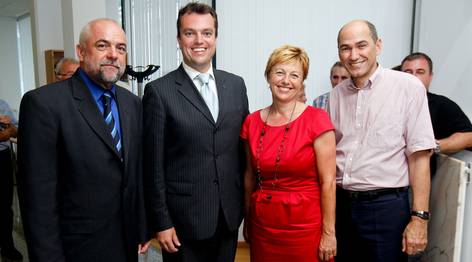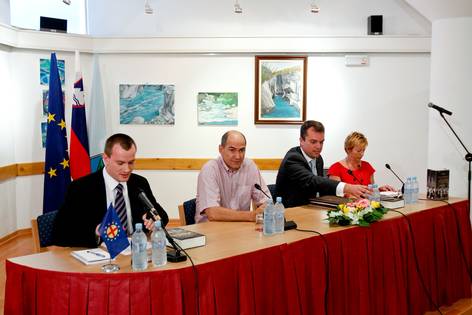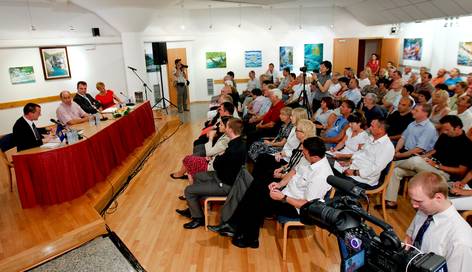NEWS
Prime Minister Janez Janša: Nobody expected us to have so much courage during the independence period
Today at Bovec, the Prime Minister of the Republic of Slovenia, Janez Janša, attended a roundtable on the topic of state and statehood, which was organised by the Slovenian Pan European Movement and the Municipality of Bovec to commemorate Slovenian Statehood Day, the Bovec municipal holiday and the 20th anniversary of the re-establishment of the Pan-European Movement in Slovenia. The roundtable was also attended by the President of the Pan-European Movement, Dr Laris Gaiser, and the historian, journalist and publicist, Dr Rosvita Pesek.
With regard to the key moments in Slovenia's struggle for independence, the Prime Minister stressed that nobody at that time believed that the Slovenian people would have had enough courage to gain independence and defend themselves through normal means. "And yet it happened, although we were more or less on our own at the beginning. This is also why Slovenia today owes nothing to anyone," he added. He noted that the twenty years of Slovenia's independence have been marked by many expectations, but also many missed opportunities. He also went on to say that, at that time, there was no uniform development of the country as a whole, which was also pointed out by the Mayor of Bovec, Siniša Germovšek, in his speech.
According to the Prime Minister, Slovenia has achieved almost all of its foreign policy objectives and must focus now on maintaining its position in Europe and the world. "Slovenia is important on an international scale, it is a part of Europe, a part of the eurozone, a member of NATO, the UN …" the Prime Minister stressed, and added that nobody at that time could have ever imagined that we would some day be a member of this international community.
The Prime Minister continued by addressing Slovenia's current objectives and priorities, and stressed that it was now crucial to ensure that the country exits this severe economic crisis and catches up in terms of development, as this indicator had dropped significantly below the EU average. In his words, the country has regressed in terms of development over the past few years. The high standard of living of its citizens has been maintained by borrowing and, instead of investing in development, Slovenia has had to service its loans.
When asked what his message would be to today's younger generations about the significance of a sovereign state, the Prime Minister replied that it was normal to expect that the younger generations would understand independence differently as they had only just been born at the time, or soon after. "The generations of today live in a different environment," he said, before adding that this generation had the freedom to travel and study anywhere in the world, describing it as a "great privilege" since it was not so simple in the past. When it comes to the citizenship awareness of today's younger generations, the Prime Minister is optimistic. The historian, journalist and publicist, Dr Rosvita Pesek, expressed her opinion on this issue that the school curricula in Slovenia should include extra hours on Slovenian history. In her view, independence is a "one-off event" that will "hopefully never happen again". In her view, the most important issue at hand is how to move forward.
The President of the Pan-European Movement, Dr Laris Gaiser, stressed that the independence government had been composed of the right people who had been in the right place at the right time and who had brought us peace, stability and international recognition as a basis for the development for which Slovenia is now ready. His message to the young generation was: "Keep on being exceptional and have faith in Slovenia."
The guests at the round table also reminisced about the days of Slovenia's struggle for independence. Prime Minster Janša spoke about the US government's surprise at the unexpected development and how it had continued to provide support to the former Yugoslav government only a few days before Slovenia declared independence. "The Brioni Agreement was the fruit of the efforts made to prevent Slovenia from gaining independence, not to grant it recognition; however, the developments at the outbreak of the war in Croatia demonstrated that there was no way back," he added.
Prime Minster Janša concluded by saying that the independence period was the most important in Slovenia's history and that it could serve as an inspiration and unite us in the future.









